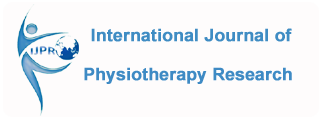IJPR.2024.101
Type of Article: Original Research
Volume 12; Issue 1 (February 2024)
Page No.: 4664-4669
DOI: https://dx.doi.org/10.16965/ijpr.2024.101
Effectiveness of Benson’s Relaxation Technique In Stressed PCOD Women
Revathi Srinivasan *1, Donnagayathri. K. J. 2, Tanisha Rizkeen. M 3, A. K Vijay Krishna Kumar 4
*1 Associate professor, Department of Physiotherapy, Dr. B R Ambedkar College of Physiotherapy, Bangalore -560045, Karnataka, India.
2 Intern, Department of physiotherapy, Dr. B R Ambedkar college of physiotherapy, Bangalore -560045, Karnataka, India.
3 Intern, Department of physiotherapy, Dr. B R Ambedkar college of physiotherapy, Bangalore -560045, Karnataka, India.
4 HOD and Professor, Department of physiotherapy, Dr. B R Ambedkar college of physiotherapy, Bangalore -560045, Karnataka, India.
Corresponding Author: Dr. Revathi Srinivasan, Associate Professor, Department of Physiotherapy, Dr. B R Ambedkar College of Physiotherapy, K. G. Halli, Bangalore -560045, Karnataka, India. E-Mail: revaphysio@yahoo.co.in
ABSTRACT
Background: Polycystic Ovary Syndrome (PCOS) is a prevalent endocrinological disorder in women, causing metabolic dysfunction and body composition changes. As of June 30, 2022, WHO estimates indicate over 116 million women (3.4%) globally are affected by PCOS. Stress, defined as worry and mental tension from difficult situations, is a major contributor to reproductive dysfunction. Reports increasingly highlight stress’s role in PCOS manifestation. The study aims to assess the Benson relaxation technique’s effectiveness in alleviating stress in women with PCOS.
Aim: To determine the effectiveness of Benson’s relaxation technique in stressed PCOD.
Methodology: Study Design: Experimental study, Study setting: Dr. B.R. Ambedkar Medical College and Hospital, Department of Physiotherapy, Bangalore -560045 Sample design: Purposive sampling. Sample size: 30 patients.
Result: A significant reduction in stress among PCOD women was observed with the use of Benson’s Relaxation Technique. The pre-perceived stress score before the technique was 22.63±5.26, decreasing to 18.23±5.98 post-intervention. The enhancement score was 4.40, with a t-value of 11.08. The analysis indicates a substantial stress reduction among PCOD women using Benson’s Relaxation Technique, as assessed through the Perceived Stress Scale (p<0.001).
Conclusion: The study conclusively demonstrated the efficacy of Benson’s Relaxation Technique in alleviating stress among women with PCOD. The analysis revealed a significant shift in stress levels, with 33.4% transitioning from high to moderate stress, 30.3% from moderate to low, and 30% maintaining moderate stress. Only 3.3% had persistent low stress, and the same percentage had persistent high stress. The pre-intervention stress score was 22.63526, decreasing to 18.2315.98 post-intervention, yielding a noteworthy enhancement score of 4.40. This signifies a statistically significant reduction in perceived stress (p<0.001), supported by a t-value of 11.08.
Keywords: Benson’s relaxation technique, PCOD, Perceived Stress Scale Stress.
REFERENCES
[1]. Basu BR, Chowdhury O, Saha SK. Possible link between stress-related factors and altered body composition in women with polycystic ovarian syndrome. Journal of Human Reproductive Sciences. 2018 Jan;11(1):10.
[2]. Goh JE, Farrukh MJ, Keshavarzi F, Yap CS, Saleem Z, Salman M, Ramatillah DL, Goh KW, Ming LC. Assessment of prevalence, knowledge of polycystic ovary syndrome and health-related practices among women in klang valley: A cross-sectional survey. Frontiers in Endocrinology. 2022;13.
[3]. Leon LI, Anastasopoulou C, Mayrin JV. Polycystic Ovarian Disease. InStatPearls [Internet] 2022 May 9. StatPearls Publishing.
[4]. A, Yamini V, Amberina AR, Eshwar MD, Vadakedath S, Begum GS,Basu BR, Chowdhury O, Saha SK. Possible Link Between Stress-related Factors and Altered Body Composition in Women with Polycystic Ovarian Syndrome. J Hum Reprod Sci. 2018 Jan-Mar;11(1):10-18. doi:10.4103/jhrs.JHRS_78_17. PMID: 29681710; PMCID: PMC5892097.
[5]. A. Denny, A. Raj, A. Ashok, C. M. Ram and R. George, “i-HOPE:Detection And Prediction System For Polycystic Ovary Syndrome (PCOS) Using Machine Learning Techniques,” TENCON 2019 – 2019 IEEE Region 10 Conference (TENCON), Kochi, India, 2019, pp. 673-678, doi:10.1109/TENCON.2019.8929674.
[6]. Conrad CD, Mauldin-Jourdain ML, Hobbs RJ. Metyrapone reveals that previous chronic stress differentially impairs hippocampal-dependent memory. Stress. 2001;4:305–18. [PMC free article] [PubMed] [Google Scholar][7]. Deak T, Quinn M, Cidlowski JA, Victoria NC, Murphy AZ, Sheridan JF, et al. Neuroimmune mechanisms of stress: Sex differences, developmental plasticity, and implications for pharmacotherapy of stress-related disease. Stress. 2015;18:367–80.
[8]. Teklemicheal AG, Kassa EM, Weldetensaye EK. Prevalence and correlates of infertility related psychological stress in women with infertility: a cross-sectional hospital based survey. BMC Psychol. 2022 Apr 7;10(1):91.Doi: 10.1186/s40359-022-00804-w.
[9]. Deswal R, Narwal V, Dang A, Pundir CS. The Prevalence of Polycystic Ovary Syndrome: A Brief Systematic Review. J Hum Reprod Sci. 2020 OctDec;13(4):261-271. Doi: 10.4103/jhrs.JHRS_95_18.
[10]. Basu BR, Chowdhury O, Saha SK. Possible Link Between Stress-related Factors and Altered Body Composition in Women with Polycystic Ovarian Syndrome. J Hum Reprod Sci. 2018 Jan-Mar;11(1):10-18. Doi: 10.4103/jhrs.JHRS_78_17.
[11]. Patel A, Sharma PS, Narayan P, Binu VS, Dinesh N, Pai PJ, et al. Prevalence and predictors of infertility-specific stress in women diagnosed with primary infertility: A clinic-based study. J Hum Reprod Sci.2016;9:28–34.
[12]. Benson H, Beary JF, Carol MP. The relaxation response. Psychiatry. 1974 Feb 1;37(1):37-46.
[13]. Ibrahim A, Koyuncu G, Koyuncu N, Suzer NE, Cakir OD, Karcioglu O.The effect of Benson relaxation method on anxiety in the emergency care.Medicine (Baltimore). 2019 May;98(21):e15452. doi:10.1097/MD.0000000000015452.
[14]. Park ER, Traeger L, Vranceanu AM, Scult M, Lerner JA, Benson H, Denninger J, Fricchione GL. The development of a patient-centered program based on the relaxation response: the Relaxation Response Resiliency Program (3RP). Psychosomatics. 2013 Mar 1;54(2):165-74.
[15]. Ibrahim A, Koyuncu G, Koyuncu N, Suzer NE, Cakir OD, Karcioglu O.The effect of Benson relaxation method on anxiety in the emergency care.Medicine (Baltimore). 2019 May;98(21):e15452. doi:10.1097/MD.0000000000015452.
[16]. Papalou O, Diamanti-Kandarakis E. The role of stress in PCOS. Expert Rev Endocrinol Metab. 2017 Jan;12(1):87-95. doi: 10.1080/17446651.2017.1266250.
[17]. Zangeneh FZ, Jafarabadi M, Naghizadeh MM, Abedinia N, Haghollahi F. Psychological distress in women with polycystic ovary syndrome from imam khomeini hospital, tehran. J Reprod Infertil. 2012 Apr;13(2):111-5.
[18]. Gupta S, Arora S. Effect of yogasana training on the self-esteem and self-efficacy of women suffering from polycystic ovarian disease. Indian Journal of Physical Education, Sports Medicine & Exercise Science. 2018;18(1):49-52.
[19]. Call D, Miron L, Orcutt H. Effectiveness of brief mindfulness techniques in reducing symptoms of anxiety and stress. Mindfulness. 2014 Dec;5:658-68.








